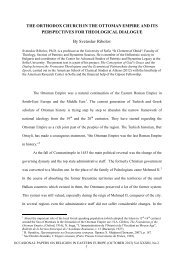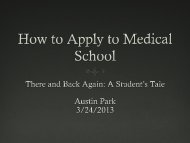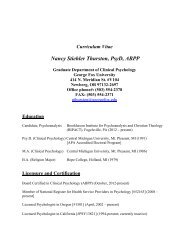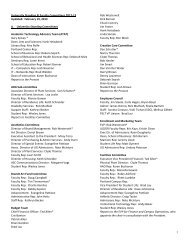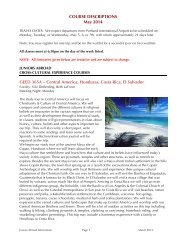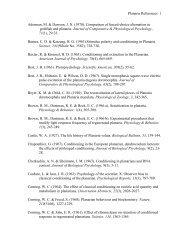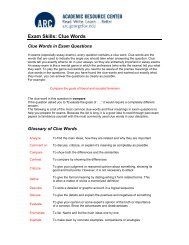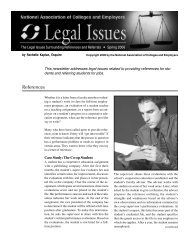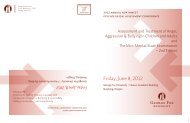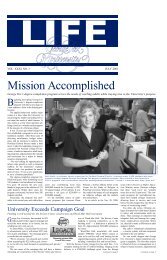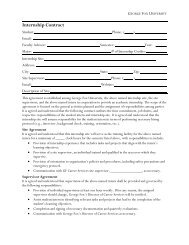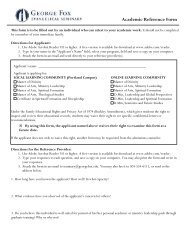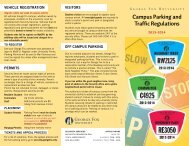LIFE Vol 32, No 4 - George Fox University
LIFE Vol 32, No 4 - George Fox University
LIFE Vol 32, No 4 - George Fox University
You also want an ePaper? Increase the reach of your titles
YUMPU automatically turns print PDFs into web optimized ePapers that Google loves.
<strong>Vol</strong> <strong>32</strong> <strong>No</strong> 4 9/24/02 9:23 AM Page 4<br />
4<br />
Friends Center<br />
Established at<br />
Seminary<br />
<strong>George</strong> <strong>Fox</strong> Evangelical Seminary is<br />
expanding in January to include a new<br />
Friends Center for Quaker studies in the<br />
<strong>No</strong>rthwest.<br />
It will be a cooperative effort with the<br />
<strong>No</strong>rthwest Yearly Meeting of Friends Church.<br />
The center’s vision statement calls for it to<br />
create a center for leadership formation,<br />
training, education,<br />
clarification<br />
of call, and<br />
preparation for<br />
ministry of evangelical<br />
Friends in<br />
the <strong>No</strong>rthwest<br />
and beyond.<br />
The Friends<br />
Richard Sartwell,<br />
director,<br />
Friends Center<br />
Center will be<br />
housed in the<br />
university’s Portland<br />
Center. The<br />
new center may set the pattern for future<br />
denominational centers, says President David<br />
Brandt. “The seminary desires to serve the<br />
church, and this is an example of the church<br />
and seminary partnering together in preparing<br />
church leaders.”<br />
<strong>George</strong> <strong>Fox</strong> will provide the center with<br />
office space and classroom facilities, faculty,<br />
and administrative support. The church organization<br />
will fund salaries and operating<br />
expenses, provide Friends instructors, and<br />
name a board of directors.<br />
Brandt said planning for the center began<br />
nearly two years ago. A study task force was<br />
established by the <strong>No</strong>rthwest Yearly Meeting;<br />
its recommendations were adopted by the<br />
church organization this summer.<br />
The new center will offer courses both<br />
through the seminary and through the church<br />
organization. Faculty will consist of current<br />
seminary and undergraduate faculty affiliated<br />
with the Friends Church, and Friends Church<br />
pastors and leaders in the area.<br />
The center is expected to eventually have<br />
about 25 full-time-equivalent students participating.<br />
Currently, the seminary has about<br />
eight Friends students enrolled. The Friends<br />
Center likely will offer courses for continuing<br />
education for current church leaders, and<br />
perhaps certificate programs in specific<br />
areas.<br />
A function of the new center will be to<br />
provide scholarship support for Friends students<br />
by raising funds and developing a<br />
scholarship program.<br />
Named the center’s first director is Richard<br />
Sartwell, longtime pastor of the Newberg<br />
Friends Church and a member of the <strong>George</strong><br />
<strong>Fox</strong> board of trustees. Sartwell served as<br />
pastor of the Newberg church for 14 years<br />
until resigning in January.<br />
The Man Behind the Name<br />
continued from page 1<br />
Quaker scholar and the university’s<br />
professor at large.<br />
Today there are an estimated<br />
400,000 Friends in the world,<br />
including 100,000 in the United<br />
States. Within the movement,<br />
beliefs range from Christ-centered<br />
evangelical (like <strong>George</strong> <strong>Fox</strong> <strong>University</strong>)<br />
to agnostic liberal.<br />
“He founded the university.”<br />
False.<br />
This is the most common misperception<br />
among students, who<br />
don’t realize <strong>Fox</strong> died 200 years<br />
before the university was established<br />
by Newberg Quaker settlers.<br />
Friends Pacific Academy<br />
was established in 1885. Pacific<br />
College was added to the academy<br />
in 1891 and was renamed<br />
<strong>George</strong> <strong>Fox</strong> College in 1949. A former<br />
college president advocated renaming<br />
the school Herbert Hoover College, after<br />
the United States president who attended<br />
the academy. Instead, a letter to the<br />
Pacific leaders from Arthur Roberts —<br />
then a recent graduate of the school —<br />
convinced them <strong>George</strong> <strong>Fox</strong>’s historic<br />
and religious significance made him a<br />
worthy namesake for the college. <strong>George</strong><br />
<strong>Fox</strong> College became a university in 1996.<br />
“He looks like the guy on the Quaker<br />
Oats oatmeal carton.” Half true.<br />
It isn’t <strong>Fox</strong> in the picture, but the<br />
Quaker Oats Company does use a portrait<br />
of a rosy-cheeked fellow wearing<br />
the same simple style of hat and clothing<br />
that all common men of <strong>George</strong> <strong>Fox</strong>’s era<br />
wore. While many Americans confuse<br />
the Amish — who continue to wear<br />
quaint homespun styles — and Quakers,<br />
Friends today do not wear clothing from<br />
that era.<br />
While the Quaker Oats Company has<br />
no ties to the Friends movement, it is<br />
one example of several unaffiliated businesses<br />
that adopted the Quaker name<br />
and image because of the Quaker reputation<br />
for integrity. <strong>Fox</strong> and early Friends<br />
challenged tradesmen to be honest, to<br />
treat their workers fairly, and to eliminate<br />
bartering.<br />
“Merchants in northwest England<br />
used to take advantage of their customers,”<br />
says Paul Anderson, professor<br />
of biblical and Quaker studies. “Quaker<br />
merchants sought to fix fair prices on<br />
goods. Even a child could be sent to the<br />
store without worry of being overcharged.”<br />
Because of their trustworthiness,<br />
Friends’ businesses — such as the Cadbury<br />
family’s chocolate company and<br />
Barclay Bank — often thrived.<br />
“He came to America and spread<br />
his beliefs around the nation.”<br />
True.<br />
<strong>Fox</strong> came to the colonies twice to<br />
preach to the colonists, slaves, and<br />
Native Americans. He viewed all as<br />
equal before God. The Friends were<br />
among the first Americans to free their<br />
slaves and were influential in ending the<br />
slave trade. The Friends movement flourished<br />
when William Penn, a Friend,<br />
established a Quaker colony called Pennsylvania.<br />
The “G” and “F” in the university’s logo —<br />
originally designed in 1973 — are based upon<br />
<strong>George</strong> <strong>Fox</strong>’s 17th-century signature.<br />
“He was a philanthropist who gave<br />
money to the university.” False.<br />
Although there are several fine universities<br />
in the United States, and the <strong>No</strong>rthwest,<br />
named after donors, <strong>George</strong> <strong>Fox</strong><br />
<strong>University</strong> is not one of them.<br />
“He was a football player.” False.<br />
Side note: Some students incorrectly<br />
believe the university does not have a<br />
football team because of its pacifistic<br />
Quaker ties. The university had football<br />
from 1894 to 1969, when the sport was<br />
phased out primarily for financial reasons.<br />
“He was an author.” True.<br />
<strong>Fox</strong> was a prolific writer. Much of his<br />
work has been gathered in eight volumes<br />
of collected writings available in the<br />
Quaker collection in the Newberg campus<br />
library. His Journal is the best<br />
known. His Book of Miracles has recently<br />
been republished with a foreword by<br />
Professor Anderson.<br />
“He wouldn’t take off his hat in<br />
front of the king.” Probably false.<br />
This likely would have been true, but<br />
it’s uncertain whether <strong>Fox</strong> ever met<br />
Charles I or Charles II. <strong>Fox</strong>’s convictions<br />
caused him to reject many social customs<br />
he saw as vain or hollow. Taking off his<br />
hat for men of higher social standing was<br />
one of them. He and other Friends<br />
refused to give the mandatory social<br />
courtesy because he took seriously the<br />
Scripture that said men should seek<br />
honor from God, not man.<br />
It didn’t stop with his hat.<br />
“As I traveled up and down I was not<br />
to bid people Good morrow, or Good<br />
evening; neither might I bow or scrape<br />
with my leg to any one; and this made the<br />
sects and professions to rage … Oh the<br />
blows, punchings, beatings and imprisonments<br />
that we underwent for not<br />
putting off our hats to men.”<br />
Professor-at-large Arthur Roberts<br />
compares the culture of <strong>George</strong> <strong>Fox</strong>’s<br />
day to today’s rigid Indian caste culture.<br />
“It was very class conscious,” he says.<br />
“These acts constituted civil disobedience<br />
to make a point: that God was the<br />
authority.”<br />
“He was called a heretic.” True.<br />
<strong>Fox</strong> and his Friends often were in<br />
trouble in England and America. Their<br />
beliefs and practices seemed radical, and<br />
<strong>Fox</strong>’s uncompromising personality made<br />
loyal followers and bitter enemies. He<br />
was known to stand up in the midst of a<br />
priest’s sermon and preach against him.<br />
“Frankly, he disrupted the<br />
peace,” says Sartwell, Friends<br />
Center director. “He considered<br />
the whole system corrupt. He<br />
felt he was minding God and<br />
speaking truth. You could even<br />
say he was arrogant. By our<br />
modern standards, most people<br />
of that century would look arrogant.<br />
It was a characteristic of<br />
religious debate in that century.<br />
<strong>Fox</strong> was a strong, charismatic<br />
leader. Add that to the way they<br />
spoke, and he comes across as<br />
arrogant to us.”<br />
It wasn’t just <strong>Fox</strong>’s hat and<br />
his preaching that irritated the<br />
authorities. <strong>Fox</strong> refused to pay<br />
tithes to the state church because<br />
he felt it was false religion. He<br />
refused to fight in the army<br />
because he found all war incompatible<br />
with the teaching of Christ. His Friends<br />
also held unauthorized religious meetings.<br />
When brought before judges, he<br />
refused to address them as “your honor.”<br />
<strong>Fox</strong> rejected giving or receiving any<br />
titles of respect. He also refused to give<br />
an oath in court, claiming that Jesus’ Sermon<br />
on the Mount instruction — to not<br />
swear and to let your yes be yes and your<br />
no be no — was sufficient.<br />
He was thrown in jail eight times,<br />
spending at total of seven years in prison.<br />
Anderson is uneasy calling <strong>George</strong><br />
<strong>Fox</strong> a heretic. “Troublemaker might be<br />
better,” he says. “The point is that he<br />
refused to go against Scripture in supporting<br />
state-sponsored religion and in<br />
placing human priests — instead of<br />
Christ — between humans and God.<br />
Look at his journal. He really comes out<br />
as quite orthodox.”<br />
<strong>George</strong> <strong>Fox</strong> and Today’s <strong>George</strong><br />
<strong>Fox</strong> <strong>University</strong><br />
“<strong>George</strong> <strong>Fox</strong> <strong>University</strong> is an evangelical<br />
Christian university with Quaker<br />
roots and an ongoing Quaker influence,”<br />
says President David Brandt. With more<br />
than 120 Friends students on campus, the<br />
university likely has more undergraduate<br />
Friends than any other university in the<br />
United States. The university also welcomes<br />
students from more than 35<br />
denominations, seeking to prepare them<br />
for Christian leadership within their own<br />
denomination or however they believe<br />
they are called into Christian service.<br />
“The Friends have been among the<br />
most inclusive of all Christian movements,<br />
affirming the importance of the<br />
kingdom of God over and above the particular<br />
parts of it, including our own,”<br />
says Anderson.<br />
“Being known as <strong>George</strong> <strong>Fox</strong> <strong>University</strong><br />
overtly ties us to a tradition that<br />
believes God will speak to us,” says<br />
Brandt. “It also has other distinctives,<br />
including our commitment to issues of<br />
social justice and reconciliation. These<br />
are important to us.”<br />
The university’s Center for Peace<br />
Learning, the new Friends Center, and<br />
the presence of Friends in many of the<br />
university’s departments are concrete<br />
examples of the continuing influence of<br />
<strong>Fox</strong>’s Friends on campus. Even more<br />
powerful is the spiritual legacy.<br />
“There are institutions that just carry a<br />
name,” says Brandt. “That’s not true<br />
here. We agree with <strong>George</strong> <strong>Fox</strong>’s principle<br />
that it is possible to know God and<br />
hear him. The name is alive.”<br />
— Rob Felton



